《管理学》课程PPT教学课件(Management, 7th Edition)Chapter 07 FOUNDATIONS OF PLANNING

Chapter 7 FOUNDATIONS TDROBBI NS ACOULTER OF PLANNING ©Prentice Hall,.2002 7-1
Chapter 7 FOUNDATIONS OF PLANNING © Prentice Hall, 2002 7-1
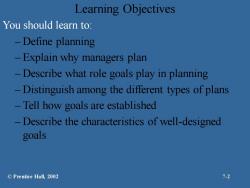
Learning Objectives You should learn to: -Define planning Explain why managers plan Describe what role goals play in planning Distinguish among the different types of plans -Tell how goals are established Describe the characteristics of well-designed goals ©Prentice Hall,2002 7-2
Learning Objectives You should learn to: – Define planning – Explain why managers plan – Describe what role goals play in planning – Distinguish among the different types of plans – Tell how goals are established – Describe the characteristics of well-designed goals © Prentice Hall, 2002 7-2
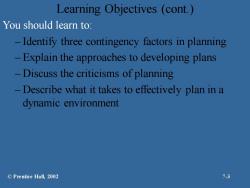
Learning Objectives (cont. You should learn to: Identify three contingency factors in planning Explain the approaches to developing plans Discuss the criticisms of planning Describe what it takes to effectively plan in a dynamic environment ©Prentice Hall,.2002 7-3
Learning Objectives (cont.) You should learn to: – Identify three contingency factors in planning – Explain the approaches to developing plans – Discuss the criticisms of planning – Describe what it takes to effectively plan in a dynamic environment © Prentice Hall, 2002 7-3
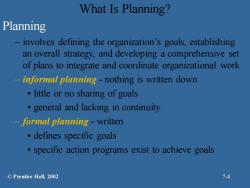
What Is Planning? Planning -involves defining the organization's goals,establishing an overall strategy,and developing a comprehensive set of plans to integrate and coordinate organizational work informall planning-nothing is written down little or no sharing of goals general and lacking in continuity -formal planning-written defines specific goals specific action programs exist to achieve goals ©Prentice Hal,2002 7-4
What Is Planning? Planning – involves defining the organization’s goals, establishing an overall strategy, and developing a comprehensive set of plans to integrate and coordinate organizational work – informal planning - nothing is written down • little or no sharing of goals • general and lacking in continuity – formal planning - written • defines specific goals • specific action programs exist to achieve goals © Prentice Hall, 2002 7-4
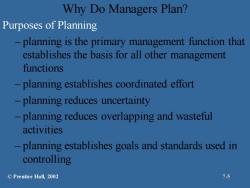
Why Do Managers Plan? Purposes of Planning planning is the primary management function that establishes the basis for all other management functions planning establishes coordinated effort planning reduces uncertainty planning reduces overlapping and wasteful activities planning establishes goals and standards used in controlling ©Prentice Hall,2002 7-5
Why Do Managers Plan? Purposes of Planning – planning is the primary management function that establishes the basis for all other management functions – planning establishes coordinated effort – planning reduces uncertainty – planning reduces overlapping and wasteful activities – planning establishes goals and standards used in controlling © Prentice Hall, 2002 7-5
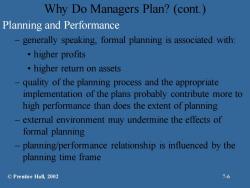
Why Do Managers Plan?(cont.) Planning and Performance generally speaking,formal planning is associated with ·higher profits higher return on assets quality of the planning process and the appropriate implementation of the plans probably contribute more to high performance than does the extent of planning external environment may undermine the effects of formal planning planning performance relationship is influenced by the planning time frame ©Prentice Hall,.2002 7-6
Why Do Managers Plan? (cont.) Planning and Performance – generally speaking, formal planning is associated with: • higher profits • higher return on assets – quality of the planning process and the appropriate implementation of the plans probably contribute more to high performance than does the extent of planning – external environment may undermine the effects of formal planning – planning/performance relationship is influenced by the planning time frame © Prentice Hall, 2002 7-6
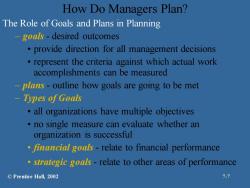
How Do Managers Plan? The Role of Goals and Plans in Planning -goal-desired outcomes provide direction for all management decisions represent the criteria against which actual work accomplishments can be measured pllads-outline how goals are going to be met Types of Goals all organizations have multiple objectives no single measure can evaluate whether an organization is successful financiall goalks-relate to financial performance strutegic goul-relate to other areas of performance ©Prentice Hall,2002 7-7
How Do Managers Plan? The Role of Goals and Plans in Planning – goals - desired outcomes • provide direction for all management decisions • represent the criteria against which actual work accomplishments can be measured – plans - outline how goals are going to be met – Types of Goals • all organizations have multiple objectives • no single measure can evaluate whether an organization is successful • financial goals - relate to financial performance • strategic goals - relate to other areas of performance © Prentice Hall, 2002 7-7
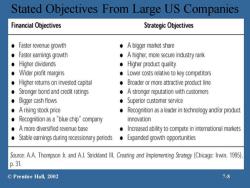
Stated Objectives From Large US Companies Financial Objectives Strategic Objectives Faster revenue growth ·A bigger market share Faster eamnings growth A higher,more secure industry rank Higher dividends Higher product quality ● Wider profit margins Lower costs relative to key competitors ● Higher retus on invested capital Broader or more attractive product line ● Stronger bond and credit ratings ● A stronger reputation with customers Bigger cash flows Superior customer service ● A rising stock price Recognition as a leader in technology and/or product ● Recognition as a"blue chip"company innovation A more diversified revenue base Increased ability to compete in international markets Stable earnings during recessionary periods Expanded growth opportunities Source:A.A.Thompson.and A.Stricklandl Creating and Implementing Strategy(Chicago:Irwin.99). p.31. ©Prentice Hall,2002 7-8
Stated Objectives From Large US Companies © Prentice Hall, 2002 7-8
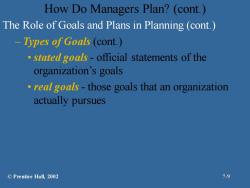
How Do Managers Plan?(cont.) The Role of Goals and Plans in Planning (cont.) Types of Goals (cont.) statedgoals-official statements of the organization's goals reall goulls-those goals that an organization actually pursues ©Prentice Hall,.2002 7-9
How Do Managers Plan? (cont.) The Role of Goals and Plans in Planning (cont.) – Types of Goals (cont.) • stated goals - official statements of the organization’s goals • real goals - those goals that an organization actually pursues © Prentice Hall, 2002 7-9
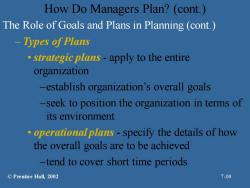
How Do Managers Plan?(cont. The Role of Goals and Plans in Planning (cont.) -Types of Plans strategic plans-apply to the entire organi☑ation -establish organization's overall goals -seek to position the organization in terms of its environment operattionallplans-specify the details of how the overall goals are to be achieved -tend to cover short time periods ©Prentice Hall,2002 7-10
How Do Managers Plan? (cont.) The Role of Goals and Plans in Planning (cont.) – Types of Plans • strategic plans - apply to the entire organization –establish organization’s overall goals –seek to position the organization in terms of its environment • operational plans - specify the details of how the overall goals are to be achieved –tend to cover short time periods © Prentice Hall, 2002 7-10
按次数下载不扣除下载券;
注册用户24小时内重复下载只扣除一次;
顺序:VIP每日次数-->可用次数-->下载券;
- 《管理学》课程PPT教学课件(Management, 7th Edition)Chapter 06 DECISION MAKING:THE ESSENCE OF THE MANAGER’S JOB.ppt
- 《管理学》课程教学资源(课件讲义)Stephen P.Robbins(9)Chapter 2 Management Yesterday and Today.pdf
- 《管理学》课程教学资源(课件讲义)Stephen P.Robbins(9)Chapter 1 Introduction to Management and Organizations.pdf
- 《管理学》课程教学资源(教师手册)Stephen P.Robbins(9)CHAPTER TWO Management Yesterday.pdf
- 《管理学》课程教学资源(教师手册)Stephen P.Robbins(9)CHAPTER ONE Introduction to Management.pdf
- 《管理学》课程PPT教学课件(Management)Stephen P.Robbins(9)第十二章 人力资源管理 Human Resource Management.ppt
- 《管理学》课程PPT教学课件(Management)Stephen P.Robbins(9)第十章 组织结构与设计 Organizational Structure and Design.ppt
- 《管理学》课程PPT教学课件(Management)Stephen P.Robbins(9)第十五章 理解群体与团队 Understanding Groups and Teams.ppt
- 《管理学》课程PPT教学课件(Management)Stephen P.Robbins(9)第十九章 运营及价值链管理 Operations and Value Chain Management.ppt
- 《管理学》课程PPT教学课件(Management)Stephen P.Robbins(9)第三章 组织文化与环境——约束力量 Organizational Culture and Environment - The Constraints.ppt
- 《管理学》课程PPT教学课件(Management)Stephen P.Robbins(9)第二章 管理的昨天和今天 Management Yesterday and Today.ppt
- 《管理学》课程PPT教学课件(Management)Stephen P.Robbins(9)第五章 社会责任与道德管理 Social Responsibility and Managerial Ethics.ppt
- 《管理学》课程PPT教学课件(Management)Stephen P.Robbins(9)第四章 全球环境中的管理 Managing in a Global Environment.ppt
- 《管理学》课程PPT教学课件(Management)Stephen P.Robbins(9)第六章 制定决策——管理者工作的实质 Decision-Making - The Essence of the Manager’s Job.ppt
- 《管理学》课程PPT教学课件(Management)Stephen P.Robbins(9)第八章 战略管理 Strategic Management.ppt
- 《管理学》课程PPT教学课件(Management)Stephen P.Robbins(9)第十六章 激励员工 Motivating Employees.ppt
- 《管理学》课程PPT教学课件(Management)Stephen P.Robbins(9)第十一章 管理沟通与信息技术 Communication and Information Technology.ppt
- 《管理学》课程PPT教学课件(Management)Stephen P.Robbins(9)第一章 管理与组织导论 Introduction to Management and Organizations.ppt
- 《管理学》课程PPT教学课件(Management)Stephen P.Robbins(9)第七章 计划的基础 Foundations of Planning.ppt
- 新疆大学:《管理学》课程教学课件(PPT讲稿)第十五章 控制方法.ppt
- 《管理学》课程PPT教学课件(Management, 7th Edition)Chapter 08 STRATEGIC MANAGEMENT.ppt
- 《管理学》课程PPT教学课件(Management, 7th Edition)Chapter 09 PLANNING TOOLS AND TECHNIQUES.ppt
- 《管理学》课程PPT教学课件(Management, 7th Edition)Chapter 10 ORGANIZATIONAL STRUCTURE AND DESIGN.ppt
- 《管理学》课程PPT教学课件(Management, 7th Edition)Chapter 11 MANAGERIAL COMMUNICATION AND INFORMATION TECHNOLOGY.ppt
- 《管理学》课程PPT教学课件(Management, 7th Edition)Chapter 12 HUMAN RESOURCE MANAGEMENT(HRM).ppt
- 《管理学》课程PPT教学课件(Management, 7th Edition)Chapter 13 MANAGING CHANGE AND INNOVATION.ppt
- 《管理学》课程PPT教学课件(Management, 7th Edition)Chapter 14 FOUNDATIONS OF BEHAVIOR.ppt
- 《管理学》课程PPT教学课件(Management, 7th Edition)Chapter 15 UNDERSTANDING GROUPS AND TEAMS.ppt
- 《管理学》课程PPT教学课件(Management, 7th Edition)Chapter 16 MOTIVATING EMPLOYEES.ppt
- 《管理学》课程PPT教学课件(Management, 7th Edition)Chapter 18 FOUNDATIONS OF CONTROL.ppt
- 《管理学》课程PPT教学课件(Management, 7th Edition)Chapter 19 OPERATIONS AND VALUE CHAIN MANAGEMENT.ppt
- 《管理学》课程PPT教学课件(Management, 7th Edition)Chapter 20 CONTROLLING FOR ORGANIZATIONAL PERFORMANCE.ppt
- 《管理学》课程教学资源(实验讲义)企业竞争模拟攻略篇.pdf
- 《管理学》课程教学资源(习题与答案)第1章 管理活动与管理理论.doc
- 《管理学》课程教学资源(习题与答案)第3章 全球化与管理.doc
- 《管理学》课程教学资源(习题与答案)第6章 计划与计划工作.doc
- 《管理学》课程教学资源(习题与答案)第十章 组织变革与组织文化.doc
- 《管理学》课程教学资源(习题与答案)第16章 管理的创新职能.doc
- 《管理学》课程教学资源(习题与答案)第1章 管理活动与管理理论.doc
- 《管理学》课程教学资源(习题与答案)第3章 全球化与管理.doc
